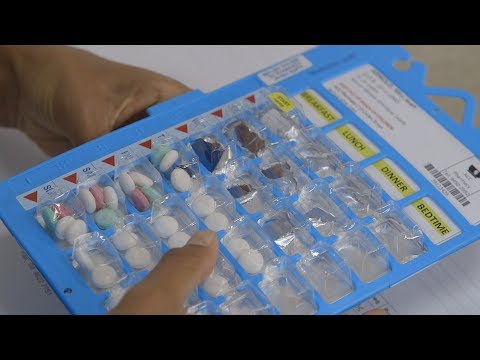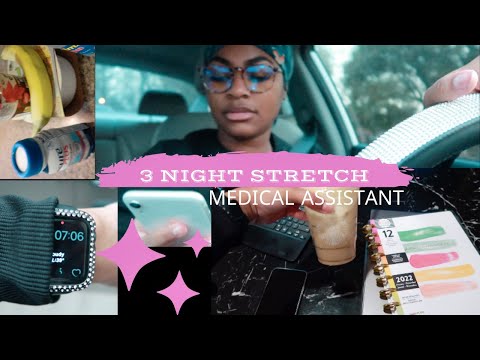Assisted Living: Getting the Assistance You Need with Medication
Contents
- Defining assisted living
- Why you may need assistance with medication
- How assisted living can help
- The benefits of assisted living
- The drawbacks of assisted living
- How to choose the right assisted living facility
- The cost of assisted living
- Making the decision to move to an assisted living facility
- Adjusting to life in an assisted living facility
- Getting the most out of assisted living
If you or a loved one are considering assisted living it’s important to know that there are many different types of assistance available. One type of assistance that is often available is help with medication. Here, we’ll explore what you need to know about getting assistance with medication in an assisted living setting.
Checkout this video:
Defining assisted living
Assisted living is a type of housing designed for seniors who need some help with activities of daily living, such as medication management, but do not need the constant medical care and supervision of a nursing home. Residents live in their own private apartments or rooms and have access to common areas, such as dining rooms, living rooms, activity areas, and outdoor space. Assisted living facilities are regulated by state laws, which vary from state to state.
The level of care provided in an assisted living facility varies depending on the needs of the individual resident. Most assisted living facilities provide basic services, such as laundry and housekeeping, as well as transportation to appointments and social activities. Some assisted living facilities also provide more comprehensive services, such as help with bathing, dressing, and grooming; medication management; and 24-hour supervision.
Assisted living is one option for seniors who need some help with activities of daily living but who do not need the constant medical care and supervision of a nursing home.
Why you may need assistance with medication
There are many reasons why you may need assistance with medication. As we get older, our bodies change and our metabolism slows down. This can make it harder for us to process medication, and it can also make us more sensitive to side effects. Additionally, many seniors take multiple medications for different conditions, which can further complicate things. That’s why it’s important to have a plan in place so that you can get the assistance you need when it comes to taking your medication.
There are a few different ways to get assistance with medication. One option is to have a friend or family member help you out. This is a good solution if you only take a few medications and if your loved ones live close by. Another option is to hire a professional caregiver. This is a good solution if you take multiple medications or if your loved ones live far away. Professional caregivers can help you with everything from getting your prescriptions filled to reminding you to take your medication on time.
No matter what solution you choose, the most important thing is that you have a plan in place so that you can get the assistance you need with your medication. If you take multiple medications, be sure to keep them organized and in one place so that your loved ones or professional caregivers can easily find them when needed. And finally, don’t hesitate to ask for help if you need it – there’s no shame in getting the assistance you need to stay healthy and safe!
How assisted living can help
There are many benefits to assisted living, but one of the most important is that it can help you with your medication. If you have trouble remembering to take your medication, or if you have trouble taking it correctly, assisted living can help.
Assisted living staff are trained to help residents with their medication. They can make sure you take your medication on time and that you take it correctly. They can also work with your doctor to make sure you are getting the right medication for your needs.
If you are considering assisted living, be sure to ask about the staff’s training and experience with helping residents with their medication.
The benefits of assisted living
Assisted living is a type of housing designed for people who need help with activities of daily living, such as bathing, dressing, and eating. Assisted living facilities usually provide care and supervision 24 hours a day, 7 days a week. They also provide three meals a day and arrange for transportation to doctor appointments and other activities.
Many assisted living facilities have staff members who are trained to give medication to residents. This can be a big help for people who have trouble taking their medication on their own. Medication reminders and assistance with opening containers and reading labels can also be very helpful.
In addition to getting help with medication, assisted living can also provide social interaction, recreational activities, and opportunities to perform volunteer work. This can help keep people healthy both physically and mentally.
The drawbacks of assisted living
There are many things to consider when making the decision to move into an assisted living facility One of the drawbacks of assisted living is that you may not have as much control over your medication regimen as you did when you were living independently.
Assisted living facilities are required to follow federal and state regulations regarding the dispensing of medications, and they must also adhere to the policies and procedures of the facility itself. This means that you may not be able to take your medications in the way that you are used to, or at the times that you prefer.
You may also find that the staff at the assisted living facility is not as familiar with your medical history as your own doctor or pharmacist is. This can make it difficult to get the help and information you need in order to make sure that your medications are working properly.
If you are considering moving into an assisted living facility, it is important to talk to your doctor or pharmacist about all of your concerns, so that you can make sure that you will be able to get the assistance you need with your medication regimen.
How to choose the right assisted living facility
When you or your loved one starts to need help with activities of daily living, it’s time to start considering an assisted living facility. But with so many options available, how do you choose the right one?
Here are a few things to keep in mind when you’re looking for an assisted living facility:
-The type of care you or your loved one needs. Does the facility provide the level of care that you’re looking for?
-The location of the facility. Is it close to family and friends? Is it in a safe neighborhood?
-The cost of the facility. Does it fit within your budget?
-The amenities offered by the facility. Does it have features that are important to you or your loved one, such as a hair salon or gym?
-The staff at the facility. Are they experienced and caring? Do they have the necessary training to provide the level of care that you’re looking for?
Choosing the right assisted living facility is an important decision. Take your time to visit several facilities and ask lots of questions. With a little research, you’re sure to find the perfect place for you or your loved one.
The cost of assisted living
The cost of assisted living is one of the biggest concerns people have when considering this type of care. It’s important to understand that the cost of assisted living can vary widely, depending on the location, type of facility, and level of care required. In general, though, the cost of assisted living is lower than the cost of nursing home care
According to a 2018 study by Genworth Financial, the median monthly cost of assisted living in the United States is $3,750. This means that half of all assisted living facilities charge less than this amount, and half charge more. The same study found that the median hourly rate for home health aides is $21.00.
It’s important to note that these costs are just averages, and your actual costs will depend on your specific situation. If you’re considering assisted living, be sure to talk to your family and financial advisors about what you can realistically expect to pay.
Making the decision to move to an assisted living facility
Making the decision to move to an assisted living facility is a big one. There are many factors to consider, such as cost, location, and the type of care you will need. One important factor to consider is whether or not the facility offers medication assistance Medication Assistance can be an important part of your care, especially if you have complex medical needs.
There are a few things to keep in mind when considering medication assistance at an assisted living facility. First, make sure to ask about the type of assistance that is available. Some facilities may have a nurse on staff who can help with medication administration, while others may only offer reminders or help with organization. Second, consider your own needs and abilities. If you are able to take your medications on your own but need some help with organization or reminders, you may not need as much assistance as someone who is unable to take their medications without help. Finally, ask about costs. Medication assistance can be included in the cost of your room and board, or it may be an additional fee. Be sure to ask about all potential costs so that you can make an informed decision about your care.
Adjusting to life in an assisted living facility
It can be difficult to adjust to life in an assisted living facility, especially if you are used to living independently. One of the biggest challenges can be getting used to taking medication on a regular basis. Here are some tips to help you make the transition:
-Talk to your doctor or pharmacist about your medications. Make sure you understand what they are for, how to take them, and what the possible side effects are.
-Set up a daily routine for taking your medication. For example, you might take it first thing in the morning or right before bedtime.
-Put your medication in a place where you will see it every day, such as on your bedside table or in the kitchen.
-If you have trouble remembering to take your medication, ask a family member or friend to remind you, or set up an alert on your phone or computer.
-Keep track of when you take your medication and how well it works for you. This will help you and your doctor make sure that the medication is working as it should.
Getting the most out of assisted living
If you or a loved one has been considering assisted living, you’re not alone. A recent study shows that more than 70% of seniors would prefer to age in place, but for many, that’s simply not possible.
The good news is that assisted living can provide the care and assistance you need to remain safe and independent. Here are a few tips to help you get the most out of your assisted living experience:
-Be sure to visit several facilities before making a decision. This will help you find the right fit for your needs and preferences.
-Ask lots of questions during your visits. The staff should be able to answer all of your questions about care, services, and costs.
-Make sure you understand the contract before signing anything. Be sure you know what services are included in the monthly fee and what, if any, additional costs there may be.
-Keep in mind that assisted living is not a long-term solution. Most people eventually need to move to a nursing home or other facility for more intensive care. However, assisted living can be a great option for those who need assistance with activities of daily living but do not yet require 24-hour care.







